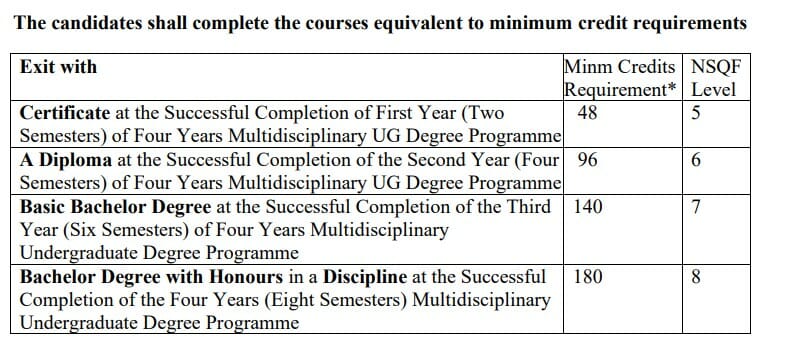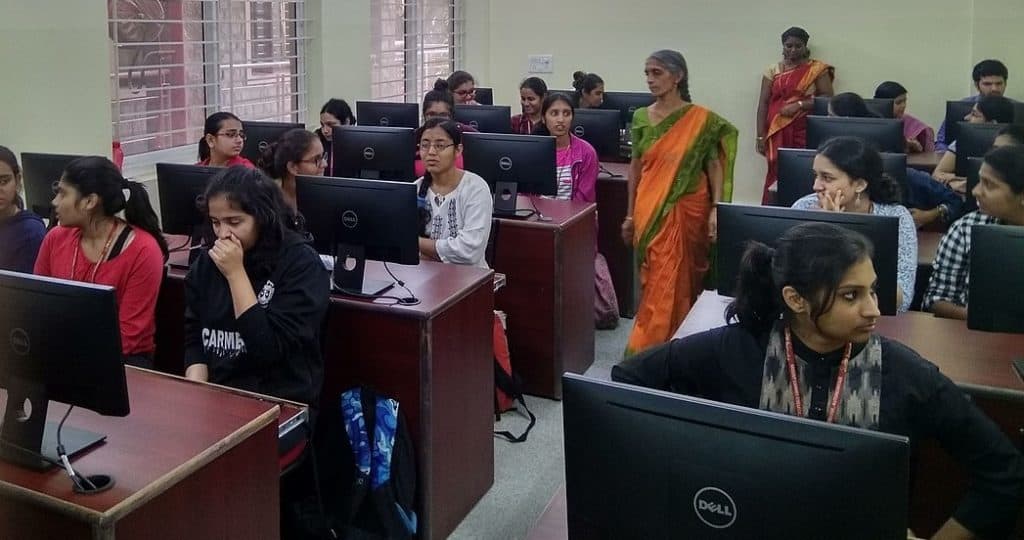With Siddharamaiah’s government scrapping the National Education Policy (NEP) 2020 and replacing it with his government’s own new education policy for Karnataka, there is not only ambiguity over what will happen to the students currently admitted as per the central NEP policy, but also lack of clarity over the very implementation of this NEP.
Here we try to explain how the National Council of Higher Education (NCHE) had proposed to go ahead with the Four-year Undergraduate Programme (FYUGP) under NEP and how Karnataka is responding to it.
What is FYUGP?
Under the University Grants Commission, Karnataka State Higher Education Council implemented the Four Year Undergraduate Programme in the academic year 2020-21 in all public universities. Private universities were free to choose which system they wanted to follow.
As per the FYUGP, the undergraduate programme would be spread over four years with a certification offered at the completion of each year.
- Students who complete their first year would receive a Certification-the terminology for which is still under discussion
- On completion of two years, the student will receive a Diploma
- Students who complete three years, will receive the Degree certificates, with the same value as degree certificates issued prior to NEP
- The fourth year is for students who clear the third year with 7.5 CGPA and who are willing to take up the fourth year, which would earn students an Honours certificate, either with/without a dissertation paper, the curriculum for which is yet to be finalised
The programme was designed with multiple entry and exit points, where students who receive certifications after completion of each year, can choose to opt out and join back to continue to the next level as they choose to.
While the completion of third year will hold the same value as a bachelor’s degree, the fourth year is completely optional and has a minimum grade mark for entry. The structure of the curriculum is multidisciplinary, with two core subjects and one open elective subject that they can opt for from other disciplines. This choice of subjects will be implemented from the first semester. Whichever student is willing to pursue the fourth year, can do so either by selecting their majors and work on a research paper, or opt for other programmes as mentioned by the UGC.
Students who finish their fourth year with a Bachelor’s degree with honours can either opt for the Doctoral Programme of their relevant discipline or enter the two year post graduate programme of any subject of their choice.
For the implementation of NEP in Karnataka, four councils will be divided with separate responsibilities. As per the final implementation plan for the state, Karnataka Higher Education Commission (KHEC) and its three verticals are conceptualised as follows:
- The Karnataka Higher Education Commission (KHEC) will be the overarching body that will guide all Higher Education in Karnataka and play a significant mentoring role in transforming college education as envisaged in the Policy
- The Karnataka Higher Education Regulatory Council (KHERC), which will be the only regulator for all Higher Education in the State, except legal and medical education
- The Karnataka Higher Education Grants Council (KHEGC) will be responsible for funding and financing based on transparent criteria
- The Karnataka Research and Innovation Council (KRIC) will catalyse research, promote innovation and collaborate with industry and public services across the State
Prof. Y S Siddegowda, Vice Chairman, Karnataka State Higher Education Council, says: “The first NEP batch will now enter the third year, and we still have another year to implement our first FYUGP. We have a uniformed curated curriculum from the centre and those who opt to graduate after the third year, can pursue their two-year Masters. However, students who finish their four year Honours programme can enter Ph.D directly and it will save them one year.”
“Since education is a part of the concurrent list, we are waiting for a decision from the state to implement the first fourth year programme. All state universities and their affiliated public colleges have implemented the NEP, while a few of the private universities have followed.”

NEP in implementation
“The policy was student friendly, but the government should have given more time for implementation, the lack of which has left most teachers confused till date, let alone students,” says Bhavya Bhanu, Head of Department (HOD), Management Studies at Maharani Lakshmi Ammanni College for Women Autonomous (mLAC).
All the colleges under Bangalore North University and other state universities implemented NEP in 2020 and there were delays in admissions, completion of semesters and examinations as well, says Prachi Pinglay-Plumber, who taught journalism as adjunct faculty at two different colleges. “Making provisions for interdisciplinary open electives was difficult, be it scheduling extra classes or planning time tables or getting students to opt for subjects outside of their courses,” she says.
While the Karnataka State Higher Education Council has said that the curriculum for the NEP batch so far has not been altered, some universities differ about implementation. Due to ambiguity over the implementation of the FYUGP and its curriculum, most colleges in Bengaluru are anxious about implementing the fourth year curriculum, and are trying to make alterations with their current curriculum to fit into the four year structure.
In contrast, some colleges have also expressed concerns over the heavy syllabus that has been provided by the government for the NEP batch. “Post graduation material has been given to students in their first year of undergraduate, which is burdening them,” says Supreetha C K, Assistant Professor, Department of Journalism at Kempegowda Institute of Management, Studies and Research (KIMSR) college. “Heavy syllabus and limited time per semester has reduced learning for students and made teaching harder as well,” she adds.
However, some professors point out how NEP has actually reduced the study material for students. “With the change from triple majors to two core subjects, there has been a rise in admissions in Christ Deemed to be University with NEP, ” says Shantharaju S, media faculty. “Though the changes may seem heavy on paper, it is technically similar, the only difference being reduction in subject pressure for students.” He also acknowledges how bigger colleges coped well with NEP due to adequate facilities and showed positive results. But the smaller colleges had to bear the brunt of the sudden changes.
With the confusion in implementation being one issue dominating the effect of NEP, the debate on whether it was student friendly or not remains split. Many professors believe that students need sufficient and rigorous academic training post undergraduation, which a two-year masters will provide, but a one year honours degree may not be able to, leading to reduced learning. While a few others point out how the credit system could benefit students for getting admitted in international universities.

New State Education Policy
Adding to the ambiguity, CM Siddaramaiah has now announced complete scrapping of NEP. School Education and Literacy Minister, Madhu Bangarappa gave a statement that SEP is likely to be implemented in the state in the next academic year and an expert panel will be formed to draft the policy. While the last state education policy was drafted in 2016-17, schools and colleges are now awaiting the new set of policy guidelines.
Though the NEP batch will finish their course as per the old policy, the amendments that will be made to cater to just one batch of FYUGP is still undecided. “The students are worried if their four year degree will hold value if they want to pursue Ph.D from next year onwards due to policy changes,” says Vivitha M K, HOD of Journalism Department at Mount Carmel College. She adds that the new policy should ensure a smooth transition, running parallel to the NEP, so as not to jeopardise students’ future education. “The new policy should ensure more practical oriented classes and workshops for students, similar to NEP, to provide them with on-field experience rather than theory based learning,” adds Meghana S M, Assistant Professor, Department of Commerce at KIMSR College.
The pitfalls of NEP have made teachers request the government for a better orientation as part of the new policy. “Our queries have not elicited any replies,” says Bhavya. “I request the government to first orient teachers and parents on their new policy for a smooth transition and uncompromised learning.” Whether NEP was visionary or not could not be answered due to the limited time of its implementation, and the current government has the responsibility to not only formulate a new policy, but also to ensure secured education for all students.
What needs to be done
- There should be complete transparency about the details of the new state education policy. The smooth implementation of it should be done paralelly to NEP
- There should be proper orientation of teachers and students to familiarise them with the implementation of the policies
I agree with the author on the ambiguities on the policy and its understanding . Per say, many aspects of the NEP are great initiatives and I do hope the government invests quality time and effort in its implementation and involve all the stakeholders.